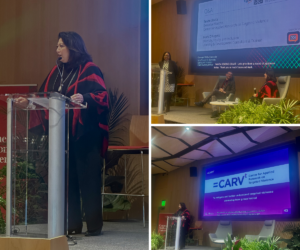The Face of Xenophobia

Understanding and Addressing Xenophobia: A Community Perspective
Xenophobia remains a persistent issue, evolving over time and requiring ongoing analysis and response. As part of Carnegie Mellon University's Combating Hate series, Susan Baida, Executive Director of CARV, and Mark D'Angelo, Diversity, Equity, and Inclusion Learning and Development Consultant at Carnegie Mellon University, examined the historical foundations, social consequences, and potential strategies to address xenophobia.
The Historical Context of Xenophobia
D'Angelo outlined the historical trajectory of xenophobia in the United States, noting that while the country is often characterized as a "nation of immigrants," policies and social attitudes have been exclusionary. Examples include anti-Catholic sentiments in colonial days; the Chinese Exclusion Act of1882; later, restrictive immigration laws, and the Japanese American internments of World War II. These instances reflect systemic efforts to limit the inclusion of certain groups.
Xenophobia today has included anti-Muslim post-9/11 policies, restrictions on Latin American immigration, and the COVID-19-fueled increase in anti-Asian violence. The presenters discussed how political rhetoric can contribute to cycles of exclusion and fear, disproportionately affecting communities of color.
The Local Impact: Pittsburgh’s Immigrant Communities
Baida provided insight into her personal experiences as the child of Ecuadorian and Korean immigrants and the challenges faced growing up in central Florida in the early 1980’s. She discussed the broader challenges of immigrant and refugee communities in Pittsburgh and AlleghenyCounty, where immigrants make up 6% of the local population and contribute significantly to economic and population growth.
Statistics presented by Baida indicated that immigrants in Allegheny County are significant contributors, with an income of $3.2 billion annually, of which $625 million goes towards federal taxes and $297.4 million to state and local taxes. Xenophobia creates barriers to accessing education, employment, health care, and legal resources.
Baida also spoke of Pittsburgh as a refugee resettlement community and how refugees and immigrants face language challenges, employment discrimination, and wage theft. Despite these challenges, immigrant communities play an important role in strengthening the region's local economy and cultural landscape.
The Consequences of Xenophobia
The effects of xenophobia extend beyond economic and societal concerns, influencing individuals' daily live lives of individuals.The speakers pointed an increase in hate crimes, linked to by xenophobic narratives against immigrant and minority groups such as The Great Replacement Theory and the tragic 2018 synagogue shooting in Pittsburgh, targeting a synagogue congregation that supported refugees.
Baida discussed systemic barriers that affect immigrants and refugees in professional and educational settings. Many individuals face difficulties in having their qualifications recognized, leading to employment in lower-paid positions despite high levels of education. In healthcare, language and cultural differences can create challenges in accessing and understanding medical treatment.
Approaches to Addressing Xenophobia
Both speakers underscored the importance of education, community engagement, and policy reform in combating xenophobia. D'Angelo emphasized self-reflection and open dialogue as essential components in challenging biases and misinformation.
Baida highlighted the efforts of local organizations such as the Alliance for Refugee Youth Support and Education (ARYSE), Jewish Family and Community Services, Casa San Jose, and the Latino Community Center. These groups provide vital services for immigrant and refugee populations, promote public education, and foster community relationships.
